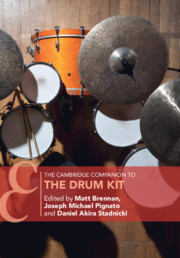Book contents
- The Cambridge Companion to the Drum Kit
- Cambridge Companions to Music
- The Cambridge Companion to the Drum Kit
- Copyright page
- Contents
- Figures
- Tables
- Music Examples
- Notes on Contributors
- Introduction
- Part I Histories of the Drum Kit
- Part II Analysing the Drum Kit in Performance
- 5 The Drum Kit beyond the Anglosphere
- 6 Drum Kit Performance in Contemporary Classical Music
- 7 Theorizing Complex Meters and Irregular Grooves
- 8 Shake, Rattle, and Rolls
- 9 Drum Tracks
- Part III Learning, Teaching, and Leading on the Drum Kit
- Part IV Drumming Bodies, Meaning, and Identity
- Index
6 - Drum Kit Performance in Contemporary Classical Music
from Part II - Analysing the Drum Kit in Performance
Published online by Cambridge University Press: 28 May 2021
- The Cambridge Companion to the Drum Kit
- Cambridge Companions to Music
- The Cambridge Companion to the Drum Kit
- Copyright page
- Contents
- Figures
- Tables
- Music Examples
- Notes on Contributors
- Introduction
- Part I Histories of the Drum Kit
- Part II Analysing the Drum Kit in Performance
- 5 The Drum Kit beyond the Anglosphere
- 6 Drum Kit Performance in Contemporary Classical Music
- 7 Theorizing Complex Meters and Irregular Grooves
- 8 Shake, Rattle, and Rolls
- 9 Drum Tracks
- Part III Learning, Teaching, and Leading on the Drum Kit
- Part IV Drumming Bodies, Meaning, and Identity
- Index
Summary
The drum kit is most commonly considered an instrument rooted in popular music traditions and is a defining element of most popular music styles. In recent years the drum kit has emerged in the unlikely context of contemporary classical music. As a result, there is an expanding repertoire of fully notated music by composers operating within the framework of Western classical music notational traditions. This chapter illuminates the influence that the drum kit has had on classical music since the early twentieth century and presents an overview of composed works starting with Darius Milhuad’s La Créations du Monde from 1923 and ending with Nicole Lizée’s Ringer from 2009. The chapter shows that early approaches to drum kit composition began as an assimilation of existing popular music styles with little progression in performance techniques and expression for the instrument. More recently composers have found a balance between contemporary classical music techniques and the drum kit’s rich traditions, grooves, and styles to make something progressive and new. Through the author, Ben Reimer’s, own commissioning, performances, and research the chapter contemplates the elements that lead to this confluence in contemporary classical drum kit music
Keywords
- Type
- Chapter
- Information
- The Cambridge Companion to the Drum Kit , pp. 79 - 93Publisher: Cambridge University PressPrint publication year: 2021

